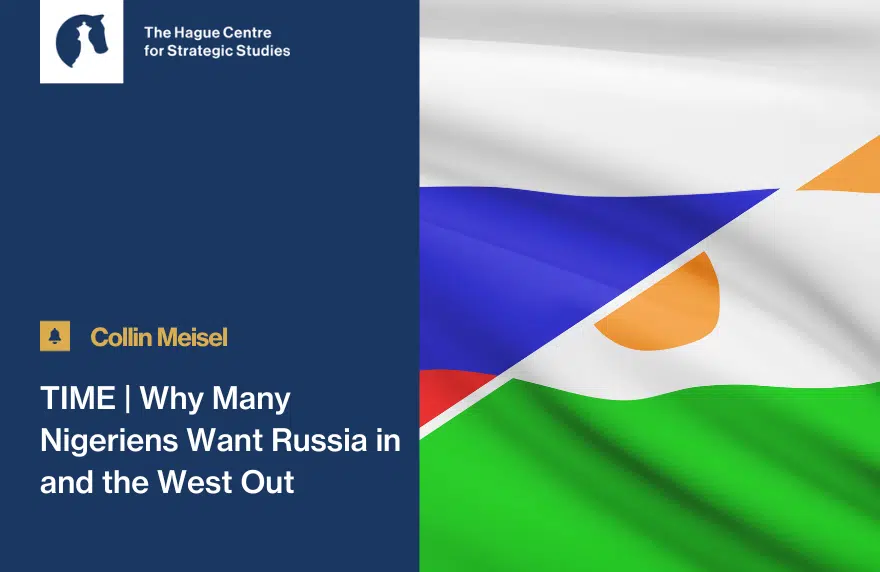The sight of Nigeriens waving pro-Putin signs and Russian flags left many in the West feeling uneasy, yet Russia’s presence in Africa is hardly new, writes HCSS subject matter expert Collin Meisel in an op-ed for TIME magazine. If U.S. and European leaders are keen to avoid another repeat of this pattern, they will need to change tack. A business-as-usual mindset will lead to an African continent that is far more closely aligned with Russia and its “no limits friendship” with China than to the West.
Opinion | Last week’s coup in Niger sent shockwaves across not only Africa’s Sahel region, but the international community at large. Niger had been the last pro-Western holdout in a region known as Africa’s “coup belt,” fueling concerns the military takeover could destabilize the region and hurt longstanding counterterrorism efforts there. Yet the sight of Nigeriens waving pro-Putin protest signs and Russian flags has left many in the West feeling uneasy. These images provide a sharp contrast for a Western public that has frequently been told that Russian President Vladimir Putin is a “pariah around the world.”
In recent years, we have witnessed a “new scramble for Africa,” with major powers like Russia and China as well as growing regional powers such as the United Arab Emirates making substantial diplomatic and economic forays into the continent. These powers, the somewhat problematic “new scramble” narrative goes, are displacing the influence of traditional colonial powers like Britain and France. For example, in largely francophone West Africa, France was once the dominant foreign power in nine of the region’s 16 countries as of 1980 compared with only three today, according to our team’s Formal Bilateral Influence Capacity Index.
Yet part of what the “new scramble” narrative misses is that Russia’s presence in Africa is hardly new. Ghana, Guinea, and Mali are cases in point, where the Soviet Union, led by Russia, is remembered as a potent anti-colonial force seeking to free Africans from European and American (and capitalist) oppression. Soviet involvement in Africa was widespread, featuring economic and military assistance for socialist-leaning governments and militias fighting liberation wars. Then and since, Russia has maintained a decades-long diplomatic presence in most African countries.
In recent years, Russian arms transfers have poured into Africa, providing 40% of arms imported by African countries since 2018. Meanwhile, the state-sponsored Wagner mercenary group has become deeply involved in the security interests of countries such as the Central African Republic and Sudan, providing not only military training but also security for gold and other mines—in return for a share of the profits.
While Russia’s overall trade with Africa is far outmatched by China, it maintains outsized influence in the continent. That includes not just arms but the crucial agricultural sector—the continent has severe food import dependence that places Russia in a unique position that China or others cannot easily fill. Disinformation campaigns have also boosted Russian influence, through anti-colonialist memes that have turned into action in the streets of Chad, Mali, and elsewhere. These efforts appear to have paid dividends for Russia at the U.N., where in repeated U.N. General Assembly votes several African nations have either voted against or abstained from condemning Russia’s war in Ukraine.
Last year, protestors waved Russian flags following a coup in Burkina Faso. This year it is Niger. If U.S. and European leaders are keen to avoid another repeat of this pattern, they will need to change tack. According to our own team’s forecasts, a business-as-usual mindset will lead to an African continent that is far more closely aligned with Russia and its “no limits friendship” with China than to the West. Unless a course correction is made, the U.S. and Europe are poised to fall further and further behind in terms of aid, trade, arms transfers, and diplomatic engagement—key sources of international influence.
To reverse the tide, the West should make further commitments to expanding trade ties and investment in Africa. Previous trade deals have been characterized as a “Kiss of Death” by promoting unfair competition that hurts African workers. (Though allegations of “debt-trap diplomacy” and exploitative resource extraction have also been lobbed at China and Russia, respectively.) To properly win hearts and minds, new trade and investment deals must be fair and sustainable, encouraging the development of African industries and the reduction of poverty.
The U.S. and Europe should also increase their budgets for the U.S. Agency for International Development and similar organizations, lest Western countries lose much of their aid-based influence in sub-Saharan Africa. Sharing more power in international organizations—including “sharing the pen” with non-permanent members at the U.N. Security Council—would also help. Otherwise, Western publics should prepare for more waving of the white, blue, and red—Russia’s tricolor flag—than of the American red, white, and blue.
Source: Collin Meisel and Adam Szymanski-Burgos for TIME Magazine, August 3rd, 2023.
Collin Meisel is the associate director of geopolitical analysis at the University of Denver’s Frederick S. Pardee Center for International Futures, a geopolitics and modeling expert at The Hague Centre for Strategic Studies, and a nonresident fellow at the Stimson Center.
Adam Szymanski-Burgos is a research associate at the University of Denver’s Frederick S. Pardee Center for International Futures.
TIME Ideas hosts the world’s leading voices, providing commentary on events in news, society, and culture. We welcome outside contributions. Opinions expressed do not necessarily reflect the views of TIME editors.





